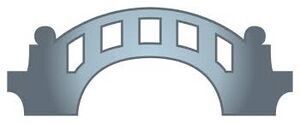Uncommon
Uncommon is one of the four rarities of Magic cards. Cards that are of uncommon rarity are often referred to as "uncommons."

Description
Uncommons have been identified by a silver-filled or black-to-white fade-filled expansion symbol since the Exodus expansion. In sets printed before Exodus rarity was not denoted on cards.
History
Regular 15-card booster packs (later known as Draft Boosters) usually contained 3 uncommons. Some of the earliest expansions; including Arabian Nights, Antiquities, The Dark, Fallen Empires, and Homelands; were packaged in 8-card booster packs that usually contained 2 uncommons. The Alliances and Chronicles expansions were sold in 12-card booster packs that also usually contain 2 uncommons.
It is known that expansions through Alliances, excluding Ice Age, had some common and uncommon cards that were more prevalent than others. This was the result of some cards appearing more often than others on the printer's sheet of uncut cards. For example, Scarwood Bandits is a U1 uncommon, and Scarwood Hag is a U2 uncommon. This code represents the number of times the card appears on the uncommon printer's sheet of uncut cards, making U2 uncommons twice as abundant as U1 uncommons. Additionally, since 8-card booster packs contained no true rare cards, U1 uncommons are often referred to as the "rares" in these expansions.
When Play Boosters were introduced in 2024, the way sets were designed for limited needs to be modified. At the highest level, the number of cards per pack was reduced from 15 to 14, and the number of common cards per pack from 10 to 7. To compensate, the number of common cards in a set was reduced to 81, from 101, to keep the frequency of seeing any one individual common at approximately the same rate.[1] To balance the frequency of commons with that of uncommons, the number of uncommon cards in a set was increased to 100 (from 80).
External links
- Sam Stoddard (November 14, 2014). "Developing Uncommons". magicthegathering.com. Wizards of the Coast.
- Mark Rosewater (March 12, 2018). "Quite the Rarity". magicthegathering.com. Wizards of the Coast.
- ↑ Mark Rosewater (October 16, 2023). "... I'm worried about what the drop from 15 card packs to 14 cards would mean for limited.". Blogatog. Tumblr.